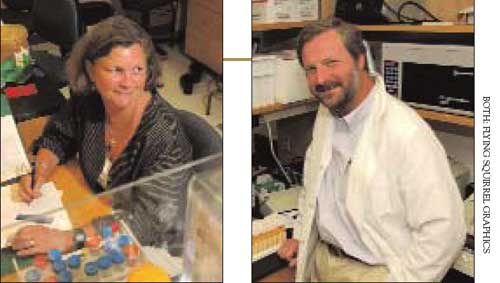Vital Signs:
$9-million multicenter
genetics grants is
based at Dartmouth
In 1958, when George Beadle and Edward Tatum shared the Nobel Prize for their pioneering "one gene/one enzyme" model, Beadle declared that genetics "grew up as an orphan." The field was not taken seriously by other scientists, he asserted, and even most geneticists took a narrow view of it. But with the pair's Nobel for work in the fungus Neurospora, the situation was changing. "Our rapidly growing knowledge of the architecture of proteins and nucleic acids is making it possible-for the first time in the history of science-for geneticists, biochemists, and biophysicists to discuss basic problems of biology in the common language of molecular structure," Beadle concluded.
Chances are, even he did not foresee how genetics would leap to the forefront of scientific inquiry. Likewise, DMS's relatively new Department of Genetics- established in 1999-has leaped to the forefront of the field. Two Dartmouth geneticists recently received a $9-million grant from the National Institutes of Health to lead a collaborative study of the functional genomics of Neurospora. The award confirms the status of the genetics of this organism as well as DMS's standing in the field.
 Photos by Flying Squirrel Graphics |
| Jennifer Loros, left, and Jay Dunlap, right, are leading a national $9-million study. |
The lead researchers on the study-Jay Dunlap, Ph.D., and Jennifer Loros, Ph.D., both of them professors of genetics and of biochemistry at DMS-have been working with Neurospora, a bread mold, for more than 20 years. Dunlap and Loros have been investigating how genes regulate biological clocks in fungi and in animals. "We can use Neurospora as a model," Dunlap explains, "because many proteins work the same way in this fungus as in animals."
Over the next five years, the DMS pair (who are marital as well as scientific partners) will oversee research on four related projects at institutions including MIT, UCLA, UC Riverside, UC Berkeley, the University of Missouri, the University of New Mexico, and Oregon Health Sciences University.
Goal: The goal of the programproject grant from the National Institute of General Medical Sciences marks a departure from Dunlap and Loros's previous work; this initiative is aimed at understanding not just Neurospora's chronobiology but the function of all its genes.
A relatively simple organism from a geneticist's point of view, it still represents a vast unexplored territory. Now fully sequenced, the Neurospora genome is predicted to contain more than 10,000 proteins, approximately 40% of which have no equivalent in any organism studied to date. Thus an examination of how its genes function will produce information both novel and valuable.
One of the projects in the study will create what's called a single nucleotide polymorphism map, which, Loros explains, "will allow us to find particular genes more easily in the genome." Other projects will focus on the systematic disruption of genes through targeted gene replacements, on providing a baseline analysis of gene expression under a variety of growth conditions, and on building an electronic database to capture and display information about phenotypes (observable characteristics that describe function).
Dunlap and Loros will lead two of the four projects, and Dunlap will oversee the entire effort. Of the study's scope, Dunlap says, "This will provide a gateway to the filamentous fungi, and it will be a hallmark of our work at Dartmouth." Adds Loros, "The grant . . . involves a real extension from our past work into a different kind of science. It will also be a wonderful opportunity for the young scientists involved."
Catherine Tudish
If you would like to offer any feedback about this article, we would welcome getting your comments at DartMed@Dartmouth.edu.
